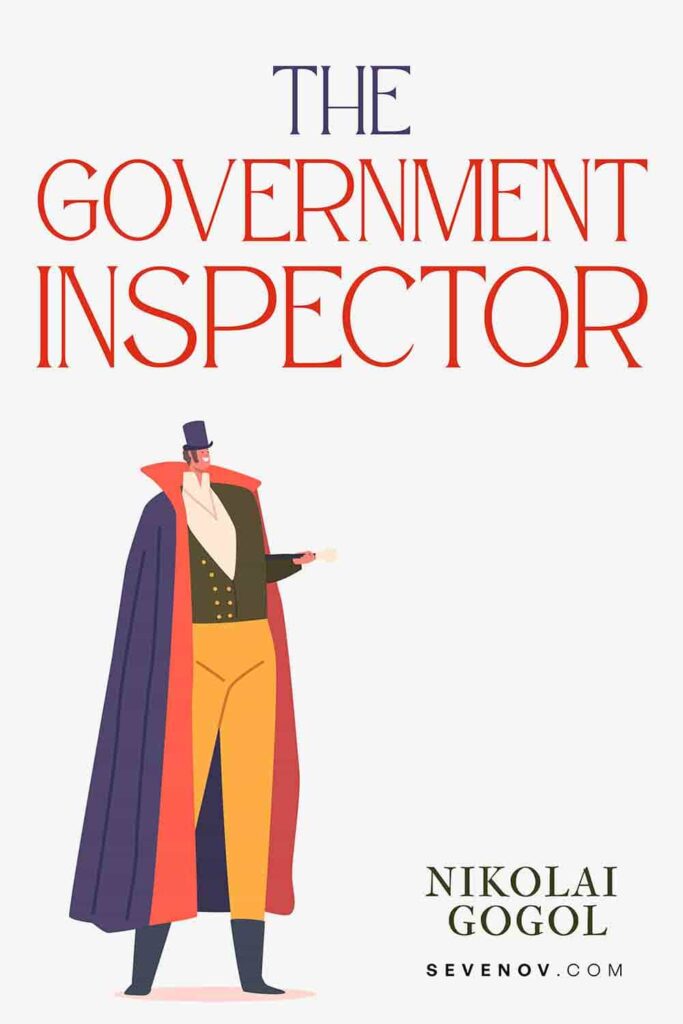
The Government Inspector by Nikolai Gogol
Author: Nikolai Gogol
Published: 1836
Genre: Plays, Comedy
The Government Inspector (Ревизор, translit Revizor), also known as The Inspector General, is an 1836 play by Nikolai Gogol. It satirizes greed, vanity, and rampant corruption in the Russian Empire. The plot revolves around a lowly civil servant, Khlestakov, who is mistaken for a government inspector by the corrupt officials of a provincial town. The officials flatter and bribe Khlestakov, hoping he will turn a blind eye to their maladministration.
The play was allegedly based on an anecdote Pushkin related to Gogol. Gogol had caught the attention of and befriended Pushkin after publishing his first collection of short stories. In 1835, Gogol wrote to Pushkin asking for inspiration for a comedic play. Pushkin is said to have shared with Gogol his experience of being mistaken for a high-ranking official while staying at an inn in a remote town.
Literary scholar Victor Erlich has called The Government Inspector “the greatest comedy in the Russian language and one of the finest ever written.” In 2014, The Telegraph ranked it as one of the best 15 written.
1. Synopsis
Khlestakov, a low-ranking civil servant, arrives in a small town. The town’s corrupt officials mistake him for the government inspector expected to visit incognito. They scurry to cover up their misdeeds while bribing Khlestakov, hoping he will ignore their maladministration. Khlestakov takes advantage of the situation, resulting in a comedy of mistaken identity.
2. Story Summary
The corrupt officials of a small town receive news that a government inspector will be visiting incognito. They start to panic and hurry to hide evidence of their wrongdoings. When they hear that a suspicious person has arrived from St. Petersburg and is charging his hotel bills to the Crown, they assume he is the inspector. However, that person is actually Khlestakov, a low-ranking civil servant.
Not realizing that he has been mistaken for someone else, Khlestakov is invited to stay at the Mayor’s house and flirts with his daughter, Maria. He enjoys the officials’ generous hospitality and takes bribes from them. When Khlestakov realizes what has happened, he spins elaborate stories about his life as a high-ranking government official. He also proposes to Maria.
The village merchants urge Khlestakov to dismiss the Mayor for demanding bribes. Khlestakov promises to oust the corrupt Mayor while pocketing more bribes from the merchants.
The Mayor learns that his daughter is engaged to Khlestakov and is pleased. Khlestakov then announces that he is returning to St Petersburg. His servant Osip had advised him to leave the town before his cover is blown.
After Khlestakov’s departure, the Mayor boasts about his daughter’s engagement with the inspector to the merchants. However, the Postmaster arrives with an intercepted letter from Khlestakov exposing his true identity and low opinion of the town officials.
Outraged at having been tricked, the Mayor blames his cronies for the mishap. At this point, he says the famous line to the audience watching the play: “What are you laughing about? You are laughing about yourselves!” A message arrives from the actual government inspector, requiring the Mayor to report to the inn immediately.
3. Characters
- Anton Antonovich – The Mayor
- Anna Andreyvna – His wife
- Maria Antonovna – His daughter
- Luka Lukich Khlopov – The director of schools
- Madame Khlopov – His wife
- Ammos Fyodorovich Lyapkin Tyapkin – A Judge
- Artemi Philippovich Zemlyanika – Charity Commissioner and Warden of the Hospital
- Ivana Kuzmich Shpyokin – The Postmaster
- Ivan Alexandrovich Khlestakov – A civil servant
- Osip – His servant
- Pyotr Ivanovich Dobchinski and Pyotr Ivanovich Bobchinski – Two gentlemen
- Dr Christian Ivanovich Hubner – A doctor
- Karobkin – An official
- Madame Karobkin – His wife
- Ukharvyotov – A police superintendent
- Police Constable Pugovkin
- Abdulin – A shopkeeper
- Another shopkeeper
- The Locksmith’s wife
- The Sergeant’s wife
- Mishka – The Mayor’s servant
- Waiter at the inn
4. Themes
4.1. Bureaucracy
The Government Inspector is a satire on the bloated, inefficient, and corrupt bureaucracy of the Russian Empire. Gogol once remarked, “In The Government Inspector I tried to gather in one heap all that was bad in Russia.” Notably, there is no one villain in the story, no master bureaucrat who oppresses everyone beneath him. Instead, the bureaucracy depicted is one where an entire system of petty bureaucrats engage in bribery, red tape, and denial to exploit their local communities.
The play suggests that the real villain is not the tyrant at the top but those complicit in accepting and perpetuating tyranny. The famous fourth wall breaking line, “What are you laughing about? You are laughing about yourselves!” calls for audience members to reflect upon their role in perpetuating the tyrannical system instead of merely laughing at others who exhibit its worst qualities.
4.2. Corruption
All the characters in this play are corrupt to some extent. The corruption of the Mayor and his cronies serves as a stand-in for the larger issue of moral corruption in society. As the townspeople depend on the officials for essential services, like healthcare, education, and law and order, this gives them immense power, which they can abuse for their gain.
The Government Inspector suggests reforming a corrupt system is not as simple as removing a corrupt leader. When Khlestakov asks the townspeople what should be done about the corruption in the town, they tell him that the Mayor should be sent to Siberia. However, they prove to be just as keen as the despised Mayor to use bribes to get what they want.
4.3. Appearances and Rank
All the town officials prioritize appearances over common sense, which is why they fall for Khlestakov’s deception. When Dobchinski and Bobchinski first meet Khlestakov at the inn, they mistake him for the Inspector General as he runs up a huge restaurant bill, which they reason only a high-ranking official would do. Khlestakov’s good looks and well-dressed appearance also attracted the attention of the two gentlemen and made them inquire about him.
Even when the Mayor’s daughter, Maria, points out that Khlestakov’s stories do not make sense, they dismiss her concerns as they have already been taken in by his fashionable dress and refined manners. Khlestakov is obsessed with appearances himself, being unwilling to sell his fine clothes even when he is hungry.
Apart from appearances, the town officials are preoccupied with rank; their desire for rank overwhelms their ability to think rationally. Thinking that Khlestakov is a high-ranking official, the townspeople are easily intimidated by him and are anxious to please him. Khlestakov flirts with the Mayor’s daughter while promising him a place in the Tsar’s retinue. The Mayor is so obsessed with rising in rank that he ignores the inconsistencies in Khlestakov’s stories about his life as a high-ranking official.
5. Influence and Legacy
The story of The Government Inspector has been adapted into numerous films, plays, and operas in different languages.
5.1. Film
Eine Stadt steht kopf is a 1932 German film adaptation of the play, directed by Gustaf Gründgens and starring S.Z. Sakall, Jenny Jugo and Hermann Thimig. In 1933, Revizor, a Czech film of the play was released, directed by Martin Frič and starring Vlasta Burian, Jaroslav Marvan and Václav Trégl.
The Inspector General (1949) is a Hollywood musical adaptation of Gogol’s play directed by Henry Koster, which shifts the story to Napoleon’s empire. The hero is an illiterate member of a band of gypsies. He’s chased out by his group and then gets mistaken for a government inspector.
A Bollywood musical adaptation, Afsar, was released in 1950. It was directed by Chetan Anand and set in the last years of British rule when tax inspectors were sent into the countryside in disguise to assess the incomes of landlords secretly. The protagonist is an unemployed youth who is mistaken for one of these inspectors and treated to a lavish reception by the local landlord.
Gli anni ruggenti (1962) is an Italian adaptation of the play set in the Fascist regime under Mussolini. The film, directed by Luigi Zampa, won Best Feature at the 1962 Locarno International Film Festival.
5.2. Theater
Inspecting Carol (1991) is a loose adaptation by Daniel J. Sullivan in which a man auditioning for a role in A Christmas Carol at a small theatre is mistaken for an informer from the National Endowment for the Arts.
In 2016, the Yermolovoi Theater in Moscow staged a production of The Government Inspector without words. Directed by Sergei Zimliansky, the show was billed as a comedy in which music, costumes, dance, and movement tell the story without words.
The Birmingham Repertory Theatre staged a revival of The Government Inspector in 2016, directed by Roxana Silbert. This production was nominated for the Laurence Olivier Award in Outstanding Achievement in Affiliate Theatre in 2017.
5.3. Opera
Der Revisor (1957) is an opera based on Gogol’s play by Werner Egk. It was first performed at the Schlosstheater Schwetzingen during the Schwetzingen Festival.
Chlestakows Wiederkehr (2008) is another opera adaptation by the composer Giselher Klebe who also wrote the libretto. It premiered at the Landestheater Detmold, Germany.




